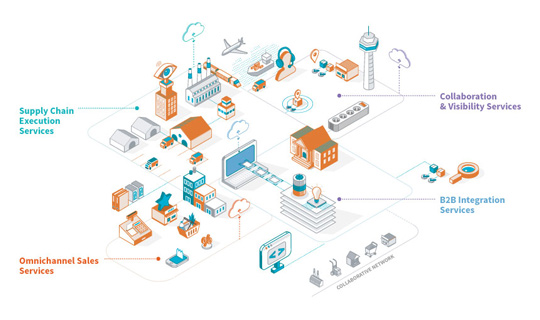
How Vendor Managed Inventory (VMI) Strengthens Supply Chain Resilience and Collaboration
To optimize inventory management, retailers and suppliers are increasingly turning to Vendor Managed Inventory (VMI) tools that transfer the responsibility…
Bona: Building Operational Excellence with Solochain WMS Read the use case

Struggling to deliver order fulfillments on time, they need to transition toward a fully digital supply chain process. This will enhance business agility, synchronize warehouse operations, and improve the productivity of supply chains from purchase to final delivery.
Whether they’re using aging, on-premises warehouse management systems (WMS), older enterprise resource planning (ERP) solutions, or still trying to get the job done with Excel spreadsheets, these companies need robust, modern, cloud-based solutions to manage their increasingly-complex supply chain operations. “In the past, companies used spreadsheets and e-mail to collaborate with business partners, which proved difficult to scale and resulted in collaboration with only a few ‘strategic’ suppliers,” SupplyChainBrain points out.
“Given today’s digital environment, collaboration tools are much more secure, easier to scale, and user-friendly,” the publication continues, “especially when drawing on Business 4.0 technologies such as mobility, cognitive analytics, artificial intelligence and machine learning, cloud-based applications, and advanced cybersecurity. Using these tools, companies can generate advanced analysis across the supply base to better understand bottlenecks and areas for improvement when working with business partners, SupplyChainBrain adds.
By 2023, Gartner, Inc., predicts that 50% of global product-centric enterprises will have invested in real-time transportation visibility platforms. It says that the COVID-19 pandemic “amplified the need” for supply chain organizations to seek tools that help them make better and more informed decisions faster. “Once shipments leave a warehouse, customers and consumers have little visibility into the status of their orders and shipments,” the research firm explains. “Real-time transportation visibility platforms address that problem, and the market is projected to grow rapidly in the next couple of years.”
Once in place, digital supply chain hubs help companies respond faster to customers’ requirements, accommodate short-notice production requests, use a single workflow to improve product and service quality, and gain greater visibility into all aspects of their supply chain—from that first inbound shipment inspection to the time the order heads out to its final destination.
Digital supply chain hubs also help companies create competitive advantage. When they have better visibility over their data and a way to effectively collaborate, for example, transparency across the entire value chain will improve. Along with that transparency comes the ability to identify and achieve corporate goals, including penetrating new markets, acquiring new customers, and rolling out new product lines.
Supply chain transparency also supports resilience and agility at a time when companies need it the most. “Looking into the future, it’s about resiliency and an ability to adapt to changes in the marketplace and new business models,” IDC Manufacturing Insights’ Simon Ellis told MIT Sloan School. “If a competitor comes along with a next-generation, digitally fueled capability, [companies] need to find a way to avoid being disrupted.”
Generix Group helps businesses improve their resiliency and rise to the top regardless of current business conditions. With its full suite of supply chain visibility and management applications, Generix also helps organizations reimagine their business through digital transformation.
With two distinct WMS solutions, Solochain WMS and Universe WMS, Generix Group provides full-featured WMS functionality, high visibility and trackability, highly configurable automation platforms, and interactive on-the-job workforce training. The modern and intuitive visual interface supports real-time decision-making and critical business needs, including fast-moving consumer goods (FMCG) as well as slow-moving consumer goods (SMCG) industries.
Furthermore, with ever-increasing changes in the industry, Generix can swiftly accommodate high growth needs from level-1 warehouse operations up to level 5, thus allowing hyper-growth for clients while digital transformation exponentially accelerates organic growth.
Focused on creating agile logistics structures, improving supply chain visibility, and gaining multi-company collaboration capabilities, companies are seeking out unified, digital platforms that support good collaboration and participation across all supply chain partners. Using a Digital Supply Chain Hub, these organizations can break down the silos of legacy supply chain systems and bring everyone onto the same platform to manage physical flows, digitize information flows, and collaboratively manage processes in real time.
Within this cooperative, interdependent, reciprocal environment that involves all players engaged in the movement of goods and services, companies can effectively run their supply chains today while also future-proofing their networks to both leverage new opportunities and manage potential disruption.
Generix Group North America provides a series of solutions within our Supply Chain Hub product suite to create efficiencies across an entire supply chain. From Warehouse Management Systems (WMS) and Transportation Management Systems (TMS) to Manufacturing Execution Systems (MES) and more, software platforms can deliver a wide range of benefits that ultimately flow to the warehouse operator’s bottom line. Our solutions are in use around the world and our experience is second-to-none. We invite you to contact us to learn more.

To optimize inventory management, retailers and suppliers are increasingly turning to Vendor Managed Inventory (VMI) tools that transfer the responsibility…

In an ever-evolving logistics environment, agile and precise warehouse resource management is essential to remain competitive. With increasing volumes driven…

France’s electronic invoicing reform relies on a Y-architecture, where Partner Dematerialization Providers (PDPs) play a central role in issuing and…

Work with our team to build your ideal supply chain software stack and tailor it to your unique business needs.